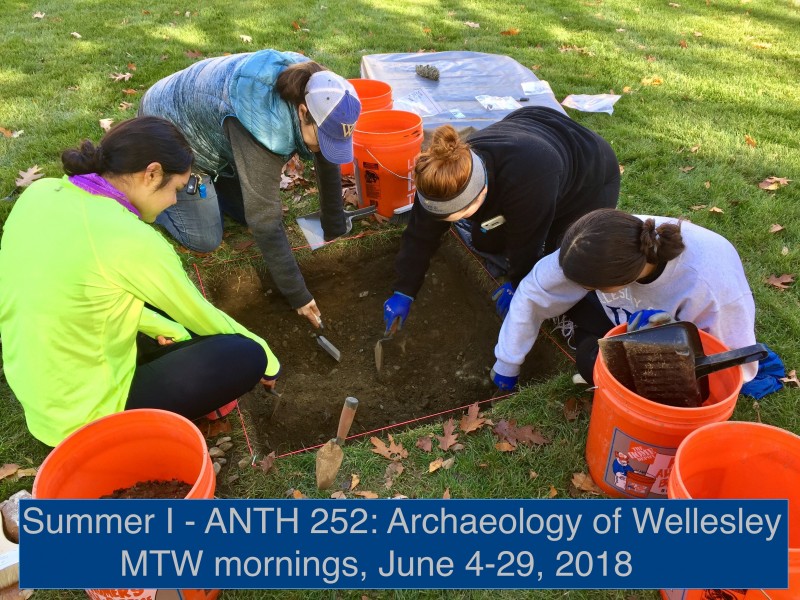Fieldwork
This listing expired on June 1, 2018. Please contact eminor@wellesley.edu for any updated information.

Location: Wellesley, MA, US
Season: June 4, 2018 to June 29, 2018
Application Deadline: May 7, 2018
Deadline Type: Exact date
Program Type:
Field school
RPA Certified:
no
Affiliation:
Wellesley College
Project Director:
Dr. Elizabeth Minor, Wellesley College
Project Description:
Wellesley College Hall Archaeology Project
A 4-week archaeology field school that covers the process of research design, site identification, survey, undertaking excavation, basics of conservation, and digital documentation. The Wellesley College Hall Archaeology Project seeks evidence of daily lives of the Wellesley community, circa 1914. Excavation will be on campus in areas containing remnants of the 1914 College Hall Fire, which destroyed the original College building overnight, finding fragments of student belongings, classroom equipment, and architecture over 100 years later. Students will identify research questions about experiences of the Wellesley community (daily life, gender, social class), and build a project addressing issues resonating with students today. Community participatory research includes involving the community through interviews, social media, and public outreach. Please note: excavation includes physical exertion, students with disability concerns are encouraged to contact the instructor and accessible fieldwork tasks will be implemented.
Wellesley, MA – June 4 – 29th, 2018 – MTW 8:30-12:30 – Three days a week (can accommodate students who are taking other classes or with summer jobs)
Application: Please fill out this application form by May 7th: tinyurl.com/WCHAPformS18
Then apply for Wellesley Summer Term at www.wellesley.edu/summer/applytosummer (see Summer Term section)
Dates: June 4, 2018 – June 29, 2018
Cost: $2700 for the course, $50 Registration Fee
Course Units: 1 Wellesley College credit (typically equals 4 semester-hours or 6 quarter-hours at other institutions)
Eligibility: Open to visiting college students who are enrolled and in good standing at other colleges and universities. US High School rising Juniors and Seniors who are in good standing and can commute to Wellesley College campus. Open to people beyond college age as well, please select “Other” as student status in Summer Term application.
Work week: Monday, Tuesday, Wednesday 08:30 am – 12:30 pm. Two Saturday sessions, flexible dates.
Housing: On-campus housing is available for college students only, by application through Wellesley College Summer Term for $150/week. For more information, see www.wellesley.edu/summer/tuition
Transportation: Not provided.
Setting: Suburban. Wooded campus and excavation site is next to a lake.
Contact: Dr. Elizabeth Minor at eminor@wellesley.edu
Period(s) of Occupation: Historical
Notes:
The Wellesley College Hall Archaeology Project seeks evidence of daily lives of the Wellesley community, circa 1914. Excavation will be on campus in areas containing remnants of the 1914 College Hall Fire, which destroyed the original College building overnight, finding fragments of student belongings, classroom equipment, and architecture over 100 years later.
Project Size: 1-24 participants
Minimum Length of Stay for Volunteers: 4 Weeks
Minimum Age: 16
Experience Required: No previous experience required. Please fill out this application form describing your interests by May 7th: tinyurl.com/WCHAPformS18
Room and Board Arrangements:
On-campus housing is available for college students only, by application through Wellesley College Summer Term for $150/week. For more information, see www.wellesley.edu/summer/tuition Cost: $150/week (for college students only)
Academic Credit:
1 unit (typically equals 4 semester-hours or 6 quarter-hours at other institutions) credits offered by Wellesley College. Tuition is $2750.
Elizabeth Minor
Anthropology, 106 Central St.
Wellesley
MA
2482
The AIA is North America's largest and oldest nonprofit organization dedicated to archaeology. The Institute advances awareness, education, fieldwork, preservation, publication, and research of archaeological sites and cultural heritage throughout the world. Your contribution makes a difference.
Notifications